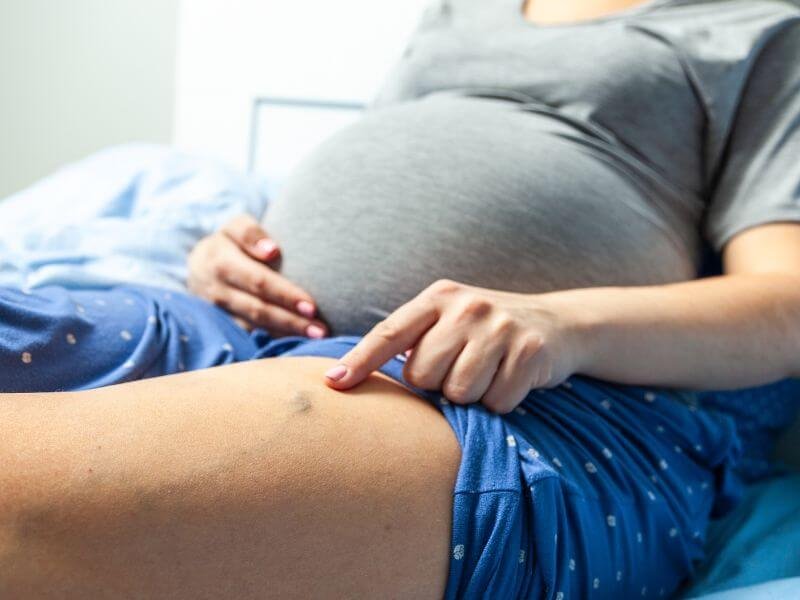Understanding Varicose Veins Post-Pregnancy: Will They Go Away?
Ask the Experts

Varicose veins are common in women, especially during pregnancy, affecting about 40% of expectant mothers. Given their prevalence, it’s natural to have questions and concerns. Here, we address some of the most common queries to help you manage and alleviate the discomfort associated with varicose veins during pregnancy.
What Causes Varicose Veins in Pregnancy?
Varicose veins often appear early in pregnancy, with many women experiencing symptoms during the first trimester. This is largely due to the physiological changes that occur during this time:
- Hormonal Changes: The fluctuation of hormones like estrogen, progesterone, and relaxin can weaken vein walls, making it harder for blood to circulate effectively. As a result, blood pools in the veins, leading to varicose veins.
- Increased Pressure: As blood volume increases to support the growing baby, the additional pressure on the veins, especially in the abdomen and legs, can cause valve failure and blood pooling, resulting in varicose veins.
- Other Factors: Age, genetics, and lifestyle also play a role in the development of varicose veins during pregnancy.
Common Areas for Varicose Veins During Pregnancy
-
Legs: The veins in your legs work hard to carry blood back to the heart, against gravity. The added pressure from your growing baby increases the strain, making leg veins particularly susceptible to varicose veins.
Symptoms of Chronic Venous Insufficiency:
- Aching or throbbing in the legs
- Heaviness or fatigue, especially at the end of the day
- Swelling around the ankles or damaged veins
- Skin discoloration
- Itchy skin
-
Vulva: Varicose veins can also develop on the outer surface of the vulva, a condition known as vulva varicosities. Increased blood flow and pressure in this area during pregnancy can lead to visible veins or discomfort.
Symptoms:
- Heaviness, pressure, or pain in the vulva
- Pain that worsens after standing, sexual activity, or physical exertion
- Swelling or itchiness around the vulva
-
Pelvic Area: Varicose veins in the pelvis, often referred to as Pelvic Congestion Syndrome, are common in women who have been pregnant. Though not always visible, these veins can cause significant discomfort and are sometimes mistaken for other conditions like endometriosis or fibroids.
Symptoms:
- Chronic pain in the pelvic area
- Abnormal vaginal discharge
- Abdominal tenderness
- Irritable bowel symptoms
- Urinary issues such as frequent urination or incontinence
- Enlarged veins in the buttocks, vulva, or thighs
-
Rectum: Hemorrhoids, or swollen veins around the anus, are common in the later stages of pregnancy. These can cause itching, discomfort, and even bleeding during bowel movements.
Preventing Varicose Veins During Pregnancy
While factors like age and genetics are beyond your control, adopting a healthy lifestyle can reduce your risk of developing varicose veins. Here are some preventive measures:
- Balanced Diet: Avoid excessive salt and processed foods, as they can increase blood pressure and the risk of varicose veins. Incorporate vein-friendly foods like leafy greens, berries, and citrus fruits.
- Stay Active: Regular physical activity during pregnancy can reduce back pain, boost energy levels, improve sleep, and enhance blood circulation. Opt for low-impact exercises like walking or prenatal yoga.
- Elevate Your Legs: Elevating your legs above heart level while resting can help improve blood circulation.
- Wear Compression Stockings: These can prevent blood from pooling in your legs and reduce the discomfort associated with varicose veins.
Managing Varicose Veins During Pregnancy
Even with preventive measures, varicose veins can still occur. Here’s how to manage them:
- Compression Stockings: Continue wearing them throughout your pregnancy.
- Sleep on Your Left Side: This position reduces pressure on the inferior vena cava, a major vein that carries blood from your lower body to the heart.
- Avoid Strain: Avoid activities that put unnecessary pressure on your veins.
- Light Exercises: Engage in gentle exercises like walking, stretching, or yoga.
Will Varicose Veins Disappear Post-Pregnancy?
For most women, varicose veins that develop during pregnancy will start to fade and may disappear within three months after delivery. However, if they persist, it’s advisable to consult a vascular specialist who can recommend appropriate treatment options.
Ask the Experts
Working Time
- Mon-Sat 09:00 - 19:00
Contact Info
-
Phone: +91 8121 200 400
+91 8121 800 400


